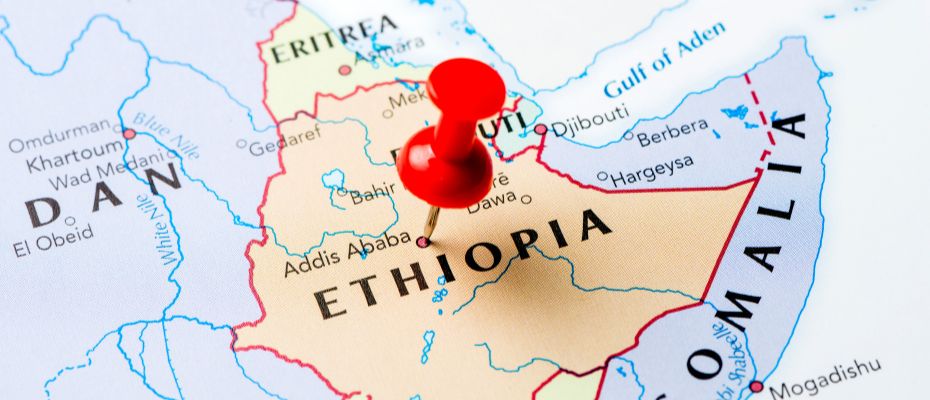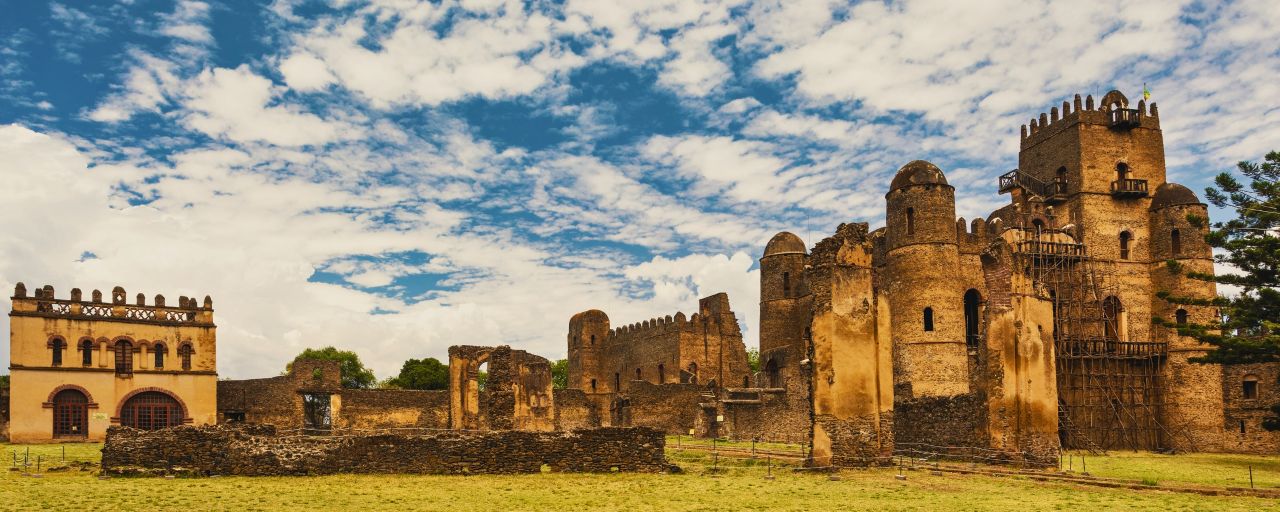Why travel to Ethiopia? Jaw-dropping landscapes, ancient African history, and beautiful culture. Known as the "Roof of Africa," Ethiopia borders Sudan, South Sudan, Djibouti, Somali, and Kenya. With a population of over 91 million people, the commonly spoken language is English, and the national language is Amharic.

Ethiopia is safe to visit with COVID-19 regulations in place. Highlights include stunning mountains, unique culture, and rich history.
1.Discovering the Charm of Addis Ababa, Ethiopia's Lively Capital
Addis Ababa, the capital of Ethiopia, means "New Flower" in Amharic. It is the fourth highest capital in the world at 2335m above sea level and is home to the African Union.
Must-visit sites include artistic orthodox churches, the National Museum (housing 2.3 million-year-old hominid "Lucy"), and open-air markets such as Merkato. At night, enjoy Ethiopian jazz in many jazz clubs for a unique experience.
2.Embracing Ethiopia's Unique Time and Calendar System
Ethiopia follows East African Time (EAT) and does not observe daylight saving time. Daytime is from 6.00 AM to 5.59 PM EAT, and nighttime is from 6.00 PM to 5.59 AM EAT.
Ethiopia uses a unique calendar, maintaining aspects of the old Coptic calendar, making it seven years behind the Gregorian calendar. Ethiopia's calendar has 13 months, with the last month having only five days, and six days during a leap year.
3.Trekking through the Majestic Simien Mountains of Ethiopia
Located in Northern Ethiopia, it is a UNESCO World Heritage Site with beautiful scenery and trekking trails. The mountains offer a breathtaking landscape and experience snowfall throughout the year.

It is an excellent destination for bird watching with over 400 bird species and home to Gelada Baboons and other wild animals. Trekking may take between five to ten days through the mountains.
4.Wildlife Exploration: Discovering Rare Species in Ethiopia
Upon arrival, visitors can experience rare and endemic animals, such as the Gelada Baboons and Walia Ibex in the Simien Mountains National Park, and the Simien foxes in the Bale Mountains National Park.
The Bale Mountains also offer beautiful scenery of glacial valleys, grooved rocks, and woodlands covered with lichen.
5.Serenity on the Waters: Boat Cruising on Ethiopia's Lake Tana
Lake Tana is Ethiopia's largest lake and a boat cruise on its waters is a must-do activity. The lake is home to ancient island monasteries, some over 20 centuries old, with beautifully painted murals depicting biblical events.
These monasteries are considered holy and include Tana Kirkos and Dega Estefanos. A boat cruise on the lake offers a chance to witness birdwatching and enjoy a magnificent view of the source of the great Blue Nile River and the Tis Isat Waterfall, which is a spectacular sight.
6.Gondar's Timeless Beauty: Exploring the Medieval Castles of Ethiopia
Gondar is a historic city located in the mountains of northern Ethiopia, which was once a capital city. It is known as the Camelot of Africa and has a rich cultural heritage, with medieval castles that make it feel like a fairytale fantasy.

Gondar is home to a Royal Enclosure with a fortress named Fasil Ghebbi, where Ethiopian emperors and princesses once ruled the country.
7.Awe-Inspiring Architecture: Visiting Ethiopia's Rock-Hewn Churches in Lalibela
Lalibela in Ethiopia has 11 ancient rock-hewn churches built during the 12th century and is known as the New Jerusalem.
The churches are linked by underground tunnels, and the largest monolithic church in the world, Biete Medhane Alem, is located there.
The cross-shaped Biete Ghiorsis Church is also worth visiting. If you're lucky, you might witness an Orthodox mass led by a priest.
8.Legendary Tales: The Ark of the Covenant and Queen Sheba in Ethiopia
Axum is an ancient city in Africa that is steeped in history and legends. It is said to be the home of Queen Sheba and the last resting place of the Ark of the Covenant, which is believed to be present in the Church of Our Lady Mary of Zion.
The church is surrounded by seventy-five vertical memorial stones, and it is considered the mother church of Ethiopia. Only one person is allowed to attest to the presence of the Ark, making it a mysterious and intriguing place to visit.
9.Uncovering the Wonders of Ethiopia's Danakil Depression
Danakil Depression is located in Eritrea and Djibouti, borders the Great Rift Valley, and houses the hottest inhabited place on earth, Dallol. The Afar community thrives here despite the scorching temperatures of 35 to 41 degrees. Lake Asale, a saltwater lake, offers a breathtaking view of the sunset.
Visiting Danakil Depression is considered as viewing the cradle of humanity as it's where Asia tore away from Africa due to volcanic activity. Despite concerns, traveling to Ethiopia is safe, and guides are available to assist you.
10.Witnessing Nature's Fury: The Lava Lake of Ethiopia
Consider trekking to Ethiopia's Erta Ale volcanic range to witness one of the six lava lakes currently present there. Erta Ale means "the smoking mountain" in Afar language. The lake is active and one of the longest in existence, and the area experiences high temperatures.
Witnessing the site will leave you in awe as you marvel at Earth's wonders. The region is rich in ancient fossils, and the famous Lucy fossil was discovered here in 1974.
11.A Feast for the Senses: Ethiopia's Delectable Cuisine and Heavenly Coffee
Injera, a flatbread made from fermented teff flour, is the staple food in Ethiopia, typically served with tibs, Doro Wat, and vegetables. Eating is communal, done in a circle with the right hand.
Ethiopia is considered the birthplace of coffee, and a coffee ceremony is a traditional practice that involves roasting and preparing coffee. Coffee is available three times a day - morning, afternoon, and evening - and was spread through trade routes such as the slave trade.
12.Celebrating Diversity: Ethiopia's Vibrant Festivals and Cultures
The most popular religions in Ethiopia are Orthodox Christianity and Islam. Orthodox Christian festivals feature bonfires of Meskel, umbrellas of Timkat, and colourful outfits.
These festivals provide a chance to experience Ethiopian culture, traditions, and people through food, drink, dance, and rituals. To experience diverse cultures, visit the Omo Valley Tribes, such as the Hamar and Mursi, who adorn themselves with unique jewelry and art and base their livelihoods on livestock.
Conclusion: Discovering the Many Wonders of Ethiopia.
Ethiopia is a year-round destination, with the best time to travel being from October to January for warm temperatures. The rainy season runs from June to August, and the cold, dry season is from February to May.
Ethiopia offers captivating scenery, delicious cuisine, the world's best coffee, diverse landscapes, friendly people, vibrant festivals, intriguing history, and culture. Don't miss out on the amazing wonders of Ethiopia. If visa issues have been holding you back.. There are no excuses not to visit Ethiopia.
Applying for an Ethiopia eVisa
- Step 1: Complete the online application by providing your personal details and passport information.
- Step 2: Make an online payment securely using your credit card.
- Step 3: Check your email for the confirmation of payment and the receipt of your Ethiopia eVisa, which will be delivered electronically.
